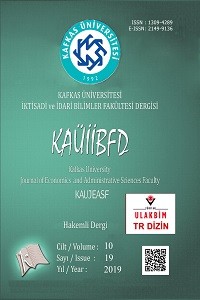Abstract
Bu çalışma,
örnek bir uygulama üzerinden işletmelerin katlandığı maliyetlerin Kaynak
Tüketim Muhasebesi (KTM) Yöntemi ile hesaplanması ve KTM’nin Faaliyet Tabanlı
Maliyetleme (FTM) Yöntemine göre farklılıklarının belirlenmesini
amaçlamaktadır. Bu amaçla TRA2 Bölgesinde eğitim hizmetleri veren bir özel
eğitim kurumunda vaka çalışması yapılmıştır. Çalışmanın kaynaklarını birincil
ve ikincil veriler oluşturmaktadır. Birincil veriler özel eğitim kurumundaki
direkt gözlemler ve personel ile görüşmeler sonucu elde edilmiş, ikincil
veriler ise literatürdeki çeşitli kaynaklardan sağlanmıştır. Uygulama
sonucunda, KTM ile yapılan hesaplamalar, KTM’nin hem daha doğru maliyet
bilgisine ulaşma hem de maliyetlerin analiz edilmesi ve sonuçların
değerlendirilmesi açısından FTM’den daha iyi sonuçlar ortaya koyduğunu
göstermiştir.
References
- Aksu, İ. (2013). Kaynak Tüketimine Dayalı Muhasebe: Bir Örnek Uygulama. Social Sciences, 8(4), 165-182. doi:10.12739/NWSA.2013.8.4.3C0116.
- Balakrishnan, R., Labro, E., & Sivaramakrishnan, K. (2012). Product Costs as Decision Aids: An Analysis of Alternative Approaches (Part 1). Accounting Horizons, 26(1), 1-20.
- Clinton, B. D., & Webber, S. A. (2004, Ekim). RCA at Clopay: Here's innovation in management accounting with Resource Consumption Accounting. Strategic Finance, 21-26.
- Garg, A., Ghosh, D., Hudick, J., & Nowacki, C. (2003, Temmuz). Roles and Practices in Management Accounting Today . Strategic Finance, 1-6.
- Karaca, N., & Küçük, H. (2017). Kaynak Tüketim Muhasebesi Temelinde Ürün Maliyetlerinin Hesaplanması-Karşılaştırmalı bir Uygulama. İşletme Araştırmaları Dergisi, 9(2), 353-375.
- Kayıhan, B., & Tepeli, Y. (2016). Yeni Bir Maliyetleme Tekniği Olarak Kaynak Tüketim Muhasebesi ve Bir Örnek Uygulama. Uluslararası Yönetim İktisat ve İşletme Dergisi(ICAFR 16 Özel Sayısı), 431-443.
- Okutmuş, E. (2015). Resource Consumption Accounting with Cost Dimension and an Application in a Glass Factory. International Journal of Academic Research in Accounting, Finance and Management Sciences, 5(1), 46-57. doi:10.6007/IJARAFMS/v5-i1/1458.
- Perkins, D., & Stovall, O. (2011). Resource Consumption Accounting – Where Does It Fit? The Journal of Applied Business Research, 27(5), 41-52. doi:10.19030/jabr.v27i5.5591.
- Sharman, P., & Vikas, K. (2004, Aralık). Lessons from German Cost Accounting. Strategic Finance, 28-35.
- Tse, M. S., & Gong, M. Z. (2009). Recognition of Idle Resources in Time-Driven Activity-Based Costing and Resource Consumption Accounting Models. Journal of Applied Management Accounting Research, 7(2), 41-54.
- Tunç, K., & Şafak, A. (2015). Kaynak Tüketim Muhasebesinde Kapasite Maliyet Yönetimi. Muhasebe ve Denetime Bakış, 15(45), 51-74.
- Webber, S., & Clinton, D. (2004). Resource Consumption Accounting Applied: The Clopay Case. Management Accounting Quarterly, 6(1), 1-14.
- White, L. (2009). Resource Consumption Accounting: Manager-Focused Management Accounting. The Journal of Corporate Accounting & Finance, 20(4), 63-77. doi:10.1002/jcaf.20501.
Abstract
The aim of this study is to calculate the costs
incurred by the enterprises using the Resource Consumption Accounting (RCA)
Method and to determine the differences of RCA from the Activity Based Costing
(ABC) Method. For this purpose, a case study was conducted in a private school
providing education services in the TRA2 Region. Primary and secondary data are
the sources of the study. Primary data were obtained through direct
observations in the private school and interviews with the staff, while
secondary data were obtained from various sources in the literature. As a
result of the application, calculations made with RCA showed that RCA reaches
more accurate cost information and analyzes the costs and evaluates the results
better than ABC.
References
- Aksu, İ. (2013). Kaynak Tüketimine Dayalı Muhasebe: Bir Örnek Uygulama. Social Sciences, 8(4), 165-182. doi:10.12739/NWSA.2013.8.4.3C0116.
- Balakrishnan, R., Labro, E., & Sivaramakrishnan, K. (2012). Product Costs as Decision Aids: An Analysis of Alternative Approaches (Part 1). Accounting Horizons, 26(1), 1-20.
- Clinton, B. D., & Webber, S. A. (2004, Ekim). RCA at Clopay: Here's innovation in management accounting with Resource Consumption Accounting. Strategic Finance, 21-26.
- Garg, A., Ghosh, D., Hudick, J., & Nowacki, C. (2003, Temmuz). Roles and Practices in Management Accounting Today . Strategic Finance, 1-6.
- Karaca, N., & Küçük, H. (2017). Kaynak Tüketim Muhasebesi Temelinde Ürün Maliyetlerinin Hesaplanması-Karşılaştırmalı bir Uygulama. İşletme Araştırmaları Dergisi, 9(2), 353-375.
- Kayıhan, B., & Tepeli, Y. (2016). Yeni Bir Maliyetleme Tekniği Olarak Kaynak Tüketim Muhasebesi ve Bir Örnek Uygulama. Uluslararası Yönetim İktisat ve İşletme Dergisi(ICAFR 16 Özel Sayısı), 431-443.
- Okutmuş, E. (2015). Resource Consumption Accounting with Cost Dimension and an Application in a Glass Factory. International Journal of Academic Research in Accounting, Finance and Management Sciences, 5(1), 46-57. doi:10.6007/IJARAFMS/v5-i1/1458.
- Perkins, D., & Stovall, O. (2011). Resource Consumption Accounting – Where Does It Fit? The Journal of Applied Business Research, 27(5), 41-52. doi:10.19030/jabr.v27i5.5591.
- Sharman, P., & Vikas, K. (2004, Aralık). Lessons from German Cost Accounting. Strategic Finance, 28-35.
- Tse, M. S., & Gong, M. Z. (2009). Recognition of Idle Resources in Time-Driven Activity-Based Costing and Resource Consumption Accounting Models. Journal of Applied Management Accounting Research, 7(2), 41-54.
- Tunç, K., & Şafak, A. (2015). Kaynak Tüketim Muhasebesinde Kapasite Maliyet Yönetimi. Muhasebe ve Denetime Bakış, 15(45), 51-74.
- Webber, S., & Clinton, D. (2004). Resource Consumption Accounting Applied: The Clopay Case. Management Accounting Quarterly, 6(1), 1-14.
- White, L. (2009). Resource Consumption Accounting: Manager-Focused Management Accounting. The Journal of Corporate Accounting & Finance, 20(4), 63-77. doi:10.1002/jcaf.20501.
Details
| Primary Language | Turkish |
|---|---|
| Journal Section | Articles |
| Authors | |
| Publication Date | June 30, 2019 |
| Acceptance Date | April 8, 2019 |
| Published in Issue | Year 2019 Volume: 10 Issue: 19 |
Cited By
Kaynak Tüketim Muhasebesinin Tarım Makineleri Sektöründe Uygulaması
Karadeniz Sosyal Bilimler Dergisi
https://doi.org/10.38155/ksbd.879581
KAYNAK TÜKETİM MUHASEBESİ: TÜRKİYE’DEKİ AKADEMİK MAKALELERİN BİBLİYOGRAFİK PROFİLİ (2007-2021)
Elektronik Sosyal Bilimler Dergisi
https://doi.org/10.17755/esosder.1057540
KAUJEASF is the corporate journal of Kafkas University, Faculty of Economics and Administrative Sciences Journal Publishing.
KAUJEASF has been included in Web of Science since 2022 and started to be indexed in the Emerging Sources Citation Index (ESCI ), a Clarivate product.

